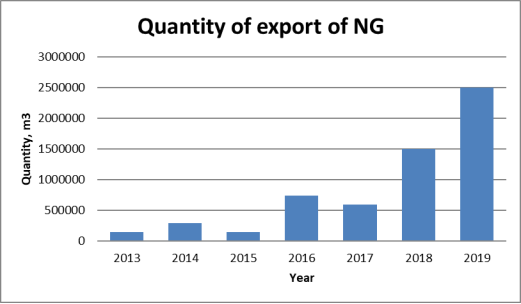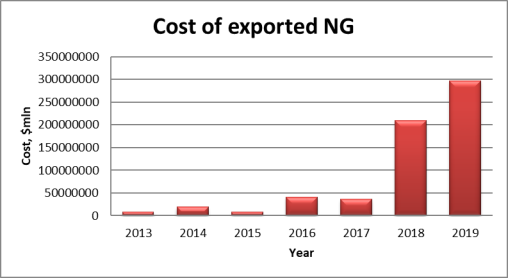Today the problem of reduction of natural energy resources is becoming more acute. The current situation is a result, corresponding to the continuous growth of global energy consumption. The growing Chinese economy requires hydrocarbon purchases, so we consider the topic of Russian-Chinese cooperation in the field of gas particularly relevant.
In the conditions of constant competition between the States-owners of energy resources, the countries try to find new ways for their transportation and realization. Energy security has received increasing attention in the framework of foreign economic strategies and national plans. A direct confirmation of this is the attempts of States to establish stable, mutually beneficial partnerships, implying direct cooperation between consumers and producers of energy resources.
The Chinese economy ranks second in the world after the United State. At the same time, China's economic growth rates have remained incredibly high for many years in a row, although they tend to decline. It is not surprising that this growth rate correlates with the level of energy consumption in the region. The Russian Federation, in turn, has a third of the world's natural gas reserves, making it one of the leading energy exporting countries in the world. In this way, the energy cooperation between Russia and China as two States is one of the most powerful and important producers and consumers of energy resources. It should also be noted that China has recently sought to gradually displace the US from the leadership position, especially in the Asia-Pacific region, where China would like to act without regard to its overseas neighbor. From this point of view, the partnership between Russia and China is also beneficial to both sides [2, 38].
However, both Russia and China have very different approaches to understanding energy security. For Russia, energy policy is so important that it is often the key factor in relations with other States. The main problem of the Russian economy is the extreme dependence on trade in the wealth of mineral resources, and the energy industry is the main pillar of Russian exports, which plays a huge role in the modern economy of the State. That is why it is so important for Russia to have a stable partnership secured by serious large contracts.
Most of experts in China and other countries recognize that Russia may be the most promising partner. In favor of this there is a complementarity of interests between Russia and China [1, 129]. Russia should develop Kirinsky, Yuzhno-Kirinsky and Mynginsky, whose initial reserves are estimated at 162.5 billion cubic meters of gas. In its turn, China must diversify oil supply, as much of the current supply comes from the world's most volatile region.
In terms of gas reserves, the Russian Federation is one of the leaders in the world. Due to gas exports, Russia has replenished its foreign exchange reserves, which contributes to Russia's economic growth. In 2014, Western countries have imposed a series of sanctions against Russia, the Russian economy was severely damaged, its economic growth has slowed. There has been a currency crisis in 2014–2015. Obtaining foreign currency for Russia is largely dependent on oil exports, which helps to ease losses due to the devaluation of the ruble. Gas trade between Russia and China has been going on for many years, and now the Chinese-Russian trade is developing more intensively, which contributes to the development of the Russian economy.
In order to avoid a shortage of natural gas, the Chinese government decided to use all possible internal and external sources. It is clear that the most quickly additional volumes of gas can be obtained through import channels. Gazprom and China national oil and gas Corporation CNPC signed a contract to supply Russian gas to China via the Eastern route. This is a 30-year contract for the supply of up to 38 billion cubic meters of gas per year. The signing took place in the presence of the heads of the two countries Vladimir Putin and Xi JingPing. Putin has called the contract «the largest in the gas sector for the era of the USSR and Russia». The implementation of the contract for the sale of Russian gas will be the largest construction site in the world for four years.
Russia and China are beginning to work out the Western route of gas supplies to China with a possible diversification of supplies. Investments in the development of Kovykta and Chayanda — the basic gas fields for supplies to China will amount to $ 55 billion, taking into account the construction of the pipeline, the investment of the Chinese side will amount to at least $ 20 billion. The price of the gas contract with China is tied to the price of oil and oil products.
The graph (Fig.1) reports the value of China’s export from Russia over the period 2013–2019. The data shows a spectacular growth of Russia and China gas export over the last decades. In particular, the values of China– Russia export of gas surged from US $8,4mln in 2013 to $297mln in 2019 [3].

Fig. 1
In 2015 we can observe (Fig. 2) sharp decrease of gas cost, the reason of which was the currency crisis in Russia in 2015. The weakening of the ruble was caused by lower oil prices and tougher anti-Russian economic sanctions [4, 26]. The initiator of the introduction of sanctions for the purpose of international isolation of Russia was the US leadership, under pressure at the risk of economic damage, the EU countries joined the sanctions. The problems of the state related to the Ukrainian sanctions in 2015 also negatively affected the internal and external economic situation of the country and provoke its movement to devaluation.

Fig. 2
China's international cooperation continues to expand. The government, national and international energy companies make an important contribution to increasing mutual trust and establish mutually beneficial cooperation between national economies. China's international cooperation in the energy sector in the foreseeable future should follow the path of strengthening and establishing partnership, as the global political environment, economic energy structure is in a state of constant unexpected changes and adjustments. China is not only a recipient of foreign capital, advanced technology and management experience, but is also accelerating the pace of domestic oil and gas exploration and development.
References:
- Ma Han “Mutual benefit and complementarity in the energy cooperation between China and Russia” / International trade and trade politics № 2(14), 2018, p.127–131
- Perfiliev Nikita “Prospects and problems of Russian-Chinese oil and gas cooperation” / SECURITY INDEX No. 1 (84), Volume 14 / 37–54p.
- Russtat URL: https://ru-stat.com/date-Y2013–2019/RU/export/CN/0527
- Tyll Ladislav The impact of economic sanctions on Russian economy and the RUB/USD exchange rate/ Tyll Ladislav, Karel Pernica, Arltová Markéta// Journal of International Studies “Scientific Papers”, 11(1), 2018, p 21–33.







